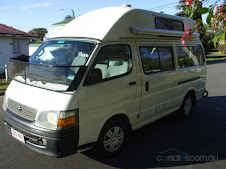NZ is having a big debate at the moment - the issue is freedom camping. Freedom camping is the practice of camping in undesignated public or private areas where no provisioning is made for toilets. This compels tourists staying in campervans (without toilet amenities) to desiccate on the roadside. The consequence is a 'minefield of turds' and spent toilet paper shrewd across private or public land.
The people is that backpacking is such a big industry these days, and there is pressure building to regulate behaviour to diminish the impact. The impact is bigger in NZ, because it is a smaller country, though it seems at this point, the greatest sensitivity is in areas which do not really embrace the tourism.
Lake Hawea is a very beautiful lake on the South Island, and the key issue is that this place has a very small commercial precinct, and I think locals are quite proud of their 'low key' living, and thus self-righteously proud of that. Rather than placing up toilet facilities, they would prefer to exclude tourists altogether. Why? Because they are not in business, so they have nothing to gain from tourists. So why not exclude others. This is why these people are sensitive.
Queenstown has a more visible and severe issue. It is a hotspot for tourism. There are a lot of bars and activities, so you can imagine that it would be a hub, and that people would simply want to spend a lot of time here. One of the problems for campervans staying here is the lack of parking in the area.
Elsewhere, I just think it is less of a problem. There are always inconsiderate people, and it would be wrong to assume that they are all foreigners. At any time there are only about 400,000 foreigners in the country, and probably 300,000 of them are staying in backpackers designated camping areas and hotels. Young Kiwis are just as likely to desiccate in the bush. I tend to find a lot of NZ'ers have little respect for their environment (as compared to Australia).
I might add that:
1. Faeces and toilet paper are biodegradable, so its mostly a visual concern, though obviously its a threat to water quality in areas, like waterways.
2. People are doing this because there are few public amenities. All it takes is to erect a pump-out toilet in those areas with a problem. I can imagine that these facilities only need to be emptied about every month. Perhaps the solution is to require consumers without a fitted toilet to pay a fee to use those facilities, and then you give them a map to find them. This means you can reasonably prosecute them for not using them. The licence can be sold by the dealerships, much as if you were selling fishing licenses. At $20 per person for 6 months, it would more than offset the cost of these services.
In
this video, we have local residents taking action to remove 'freedom campers'. Unreasonable impositions on freedom campers is destined to push them further into the bush. That means these people are driving more and spending less money in NZ, going to NZ, but rather there money going to Saudi Arabia in the form of petroleum imports.
I have been to camping grounds where people have liberally shit in inappropriate places. It is not just the lack of concealment, they dump near watercourses. This practice is best handled with a license sticker on vehicles, displayed when they are at the site between certain hours, i.e. If you are in an undesignated site after 6pm or before 7am, then you pay the fine if you don't have a sticker. The question is how do you fine a transient like a tourist? Maybe the NZ government has to collect a bond, otherwise the police will start having to take credit card payments :)
------------------------------------------







2 comments:
"Young Kiwis are just as likely to desiccate in the bush. I tend to find a lot of NZ'ers have little respect for their environment (as compared to Australia). "
umm... you mean defaecate (to poo) not dessciate (to dehydrate)? Anyway - (as an ecologist who has worked in both countries) I don't think that comment is fair - the two countries are comparable unless you have some good statistics to back up your statement.
And yes - I frequently tent camp around in both countries, and often find myself cleaning up after others. I do find the mess left behind rather appalling - especially the piles of excreta and paper. I do sympathise with the current freedom camping issue that councils currently face, because of what I have seen. Cheap campgrounds and DoC sites are readily available, and that information is readily available online.
http://www.camping.org.nz/
dessicate even
Post a Comment